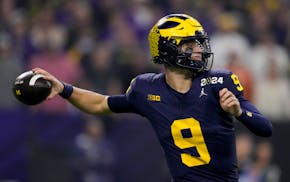If there is such a thing as objective analysis, this will not fit into that dubiously-described category.
I'm thrilled Torii Hunter is returning to the Twins.
He fits in terms of baseball skills — he is a veteran righthanded hitter who can produce runs and help an outfield that is young and mostly lefthanded.
But that's not why I'm thrilled.
I'm thrilled because Hunter is one of my favorite people in sports. I've known him for more than 20 years. I watched him evolve from a raw high school kid from Arkansas who did not know what a slider was into not only a star, but an ambassador for the entire sport.
I watched him struggle at every level of the minor leagues, and bounce between the minors and majors without losing faith in himself or enthusiasm for the game.
I watched him charge into fences when he could have opted to preserve his health and earning potential.
I found him to be the most engaging and compelling personality in a sports world filled with robots.
I watched him urge teammates to compete. I watched him turn the Twins' clubhouse into the most entertaining space in sports, and I watched that clubhouse become a morgue after he left.
The Twins have yet to make an offseason move that will alter any statistical analysis of their roster, but they are better today than they were at the end of the 2014 season. Hunter, along with new manager Paul Molitor and bullpen coach Eddie Guardado, can make that much of a difference in this clubhouse.
Even if the Twins signed the three best free agents on the market, their future would remain in the hands of their top three prospects.
Alex Meyer might be the Twins' most important prospect currently, because of the importance of starting pitching.
Byron Buxton and Miguel Sano will soon be the Twins' best players, and Hunter will be the ideal mentor for them.
During Hunter's first major-league spring training camp, he walked into the clubhouse in Fort Myers and discovered his locker located between two future Hall of Famers, David Winfield and Kirby Puckett.
Puckett had arranged the seating chart himself.
Puckett not only held long conversations with Hunter, he showed him his overstuffed wallet — cash was king in those days — and told him to take whatever he needed whenever he needed it.
Hunter never forgot what Puckett did for him, and he became a willing mentor or friend for any young player willing to listen.
After he signed with the Angels, Hunter became the most popular figure in the clubhouse and was chosen as their ambassador when they hosted the All-Star Game.
In Detroit, Hunter again became the best personality in a winning clubhouse.
What was most interesting was that every time I saw him after he left the Twins, Hunter would wait until we were alone and recount his negotiations with the Twins, insisting that he would have stayed had he been able to negotiate with Terry Ryan instead of his replacement as Twins general manager, Bill Smith.
Here he was, playing for contenders and making more money than he could have imagined as a rookie, and he never got over his departure from his first franchise.
Now he's back and the Twins' clubhouse will be a different place.
Molitor was the smartest player I ever covered, someone who could steal signs or call opponents' pitches before the start of the second inning.
Guardado was the greatest overachiever I've met in sports, a failed starter turned one-out reliever who turned himself into an All-Star closer with a 90-mile-per-hour fastball and a slider that barely slid.
Hunter was the best competitor and personality I've ever encountered in baseball, the rare athlete who could combine a raging competitive fire with childlike joy.
Now Molitor, Guardado and Hunter will try to usher in a new era of winning.
It would be surprising if Buxton's locker isn't next to Hunter's this spring, and if he doesn't offer the contents of his brain, if not his wallet, to the Twins' next star center fielder.
Jim Souhan's podcast is at Souhanunfiltered.com. Twitter: @Souhanstrib. • jsouhan@startribune.com

Souhan: These seven plays showcase Wolves' new defensive fire

Souhan: Wolves fans made Game 1 special. Now bring on Game 2.

Souhan: Should Vikings even consider McCarthy in NFL draft?

Souhan: NAW erases Suns' lead, Game 1 advantage with big performance

